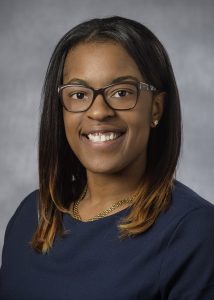
Adaku Ume is a student in the M.D./Ph.D. dual-degree program in biomedical sciences at the Boonshoft School of Medicine.
Adaku Ume, a student at the Wright State University Boonshoft School of Medicine, received the Porter Physiology Development Fellowship from the American Physiological Society, the first Wright State student to receive this fellowship.
Ume, a native of Los Angeles, is in her third year of the M.D./Ph.D. dual-degree program in biomedical sciences at Wright State.
Founded in 1887, the American Physiological Society promotes scientific collaboration and discovery in physiology, a branch of biology that deals with the way a living organism or bodily part functions. APS members are advancing treatments and cures for illnesses including kidney disease, cancer, heart disease, obesity and addiction.
The Porter Physiology Developmental Fellowship encourages diversity by supporting graduate students from underrepresented racial and ethnic minority backgrounds pursuing a Ph.D. in the physiological sciences.
The fellowship will provide funding for Ume’s education in the M.D/Ph.D. program, membership to the American Physiological Society and resources for career development.
Ume advised other budding researchers to never hesitate to seek funding opportunities. If your project is highly significant in the advancement of medicine, agencies will most likely fund your idea, she said.
Ume’s research involves investigating the molecular mechanism by which calcineurin inhibitors (CNIs), a class of potent immunosuppressant drugs, cause kidney fibrosis. The immunosuppressive effect of CNIs was initially utilized in organ transplantation but has extended into use for managing inflammatory conditions such as lupus and vitiligo. Although CNIs have dramatically improved the quality of care, long-term use has been attributed to irreversible kidney damage. Ume’s research potentially advocates for the development of newer generation CNIs that will not adversely affect renal function.
Although Ume has not yet defined a clinical specialty, she is interested in a career as a physician-scientist.
“Adaku is an outstanding junior scientist. She is a creative thinker, a careful experimentalist, dedicated and driven. Most importantly encompasses the attitude of a team player and makes our needs as a lab group a priority. Adaku has contributed to three scientific publications and has been awarded three grants,” said Clintoria Williams, Ph.D., assistant professor of neuroscience, cell biology and physiology (NCBP) in the Boonshoft School of Medicine and assistant professor in the College of Science and Mathematics.
Williams herself received a Porter Physiology Development Fellowship when she was a graduate student. “I am honored to continue the legacy of molding the next generation of biomedical scientists,” she said.
Ume said Williams is an outstanding mentor. “She has been the primary contributor to my evolution into a scientist as a Black woman,” said Ume.
She praised other Boonshoft School of Medicine faculty who have helped her prepare for whatever her future holds.
“They challenge me to critically think outside the box while giving me the confidence to understand with hard work and perseverance I can be a force in my field of choice,” said Ume.
Ume said her parents have had the most influence on her educational pursuits. “Watching them endlessly give to others has instilled my desire to live for a cause bigger than myself,” she said.
“This is a great honor for Adaku and Dr. Williams, as well as for the entire NCBP family and the medical degree and biomedical sciences Ph.D. programs,” said Eric Bennett, Ph.D., professor and chair of the Department of Neuroscience, Cell Biology and Physiology. “Such nationally competitive awards validate not only the excellence, hard work, creativity and determination of students and their mentors within our program but also the faculty and staff who educate and train these students.”
Ume earned her bachelor’s in cell and developmental biology from the University of California, Santa Barbara, and a master’s degree in pharmacology from Georgetown University.
“I will never forget that it was not an easy journey getting into medical school,” she said. “I am very grateful to the people who advocated for my acceptance into both the M.D. and Ph.D. programs!”

 Wright State business professor, alumnus honored by regional technology organizations
Wright State business professor, alumnus honored by regional technology organizations  Wright State University Foundation awards 11 Students First Fund projects
Wright State University Foundation awards 11 Students First Fund projects  Gov. DeWine reappoints Board Treasurer Beth Ferris and names student Ella Vaught to Wright State Board of Trustees
Gov. DeWine reappoints Board Treasurer Beth Ferris and names student Ella Vaught to Wright State Board of Trustees  Joe Gruenberg’s 40-Year support for Wright State celebrated with Honorary Alumnus Award
Joe Gruenberg’s 40-Year support for Wright State celebrated with Honorary Alumnus Award  Wright State’s elementary education program earns A+ rating for math teacher training
Wright State’s elementary education program earns A+ rating for math teacher training 